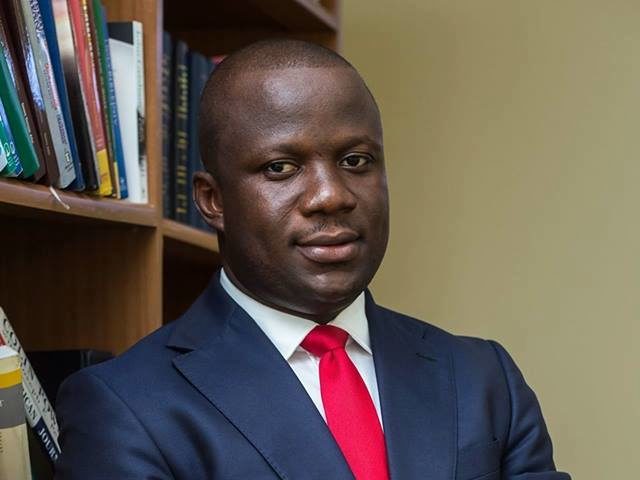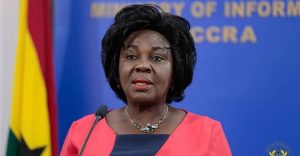Ghana’s Minister of Lands and Natural Resources, Samuel Abu Jinapor, has urged world leaders to invest in science and technology “that prevent impacts of climate change on the livelihoods of the people we lead. Let us move towards actions to reduce our carbon footprints that exacerbate climate change.”
Samuel Abu Jinapor, who was speaking at the 12th Bosphorus Summit in Istanbul, Turkey, said available data on the level of deforestation is alarming and requires collaborative efforts globally to reverse the trend.
“Deforestation and forest degradation continue to take place at an alarming rate, especially, in the tropics. These, significantly contribute to loss of biodiversity, climate change, and agricultural productivity. There is, therefore, the need to find solutions to ensure forest sustainability.”
The Bosphorus Summit is an annual international economic event held in Turkey’s commercial capital, Istanbul. This year’s event opened on Monday, December 6.
The two-day event, organized by the International Cooperation Platform (ICP), is being held under the theme of ‘Meeting the challenges for a Better World’, with top government officials, experts and academics in attendance.
This year’s summit was opened by the President of Turkey, Recep Tayyip Erdoğan.
The 2-Day event deliberated on several other topics including banking and finance, cybersecurity and defense industry, the role of technology in tackling climate change, women in science, economy, and law, change and transformation process of Turkey’s apparel industry, sustainability in aviation and the future of the automotive sector, the importance of health after COVID-19, EU trade agreements and the green deal, sustainable investment, and the COVID era – the importance of agriculture, food security and digital agriculture among others.
Speaking on the topic, ‘The effect of climate change on the ecosystem and the importance of Forest and Sustainable Livelihoods,’ under the sub-theme, ‘The COVID-era – The importance of agriculture, food security and digital agriculture, Samuel Abu Jinapor, made a passionate appeal to world leaders to commit resources to tackle climate change.
While reiterating Ghana’s commitment to contribute to the global efforts at halting climate change and its attendant debilitating consequences, the Minister called for “investment in technology and science that prevent impacts of climate change on the livelihoods of the people we lead. Let us move towards actions to reduce our carbon footprints that exacerbate climate change.”
Using Ghana’s agriculture sector as a point of reference, Samuel Jinapor urged world leaders to be interested in sustainable agriculture.
“Times have changed, we have moved from the position of measuring poverty by food security or the lack of it. Poverty is not only based on food security, but there is also the need to add multidimensional characteristics such as sustainable livelihoods.”
Ghana is implementing strategic programmes to combat climate change
Samuel Abu Jinapor told the summit that the government of Ghana is implementing two major interventions to urgently respond to the effects of climate change on its ecosystem and agriculture.
“The Government of Ghana has taken practical steps to ameliorate the impacts of climate change on our ecosystem and agriculture. These are the Ghana Cocoa Forest REDD+ Programme (GCFRP) in cocoa forest landscape, mainly in the southern part of the country, and the Ghana Shea Lands scape Emission Reduction Programme in the Northern Savannah zones of the country”.
“These two (2) programmes seek to enhance the ecosystem functionality to deliver emission reductions in Ghana’s major commodity supply chains (Cocoa in the south and Shea in the north), biodiversity protection and conservation, whilst improving livelihood opportunities for farmers, women groups and forest users, in general.”
The Minister also spoke about one of the government’s flagship programmes initiated in Ghana to address climate change, being the GREEN GHANA PROJECT.
“In accordance with the vision of the President of the Republic of Ghana, the Green Ghana Project was successfully executed on June 11, 2021, during which a total of seven (7) Million seedlings were planted in a day, across the country. The Green Ghana Project next year, 2022, will see to the planting of twenty (20) million seedlings in a day. The commitment to plant twenty (20) million trees in the year 2022, was announced by the President of Ghana, at the World Leaders’ Summit at COP26 in Glasgow.”
He also added that the government of Ghana intends to roll out a Robust Afforestation and Reforestation Programme, aimed at restoring degraded landscapes by both the private and public sectors.
“The programme is quite ambitious and requires sustainable financing and logistical support. We are, therefore, ready to partner countries, institutions, or private sector actors, who wish to share our rich experiences and best practices in landscape restoration” he noted.
“We, in Ghana, believe that, countries are unequal in terms of development. Whilst some have developed, others are on the verge of developing. As a result, nations are likely to take actions based on their ability and capacity. However, I am of a firm conviction that we can only achieve our aim if global climate actions are real and verifiable. And this, we must do, by embracing real and verifiable emission reduction initiatives in our forest sector”.







